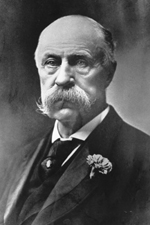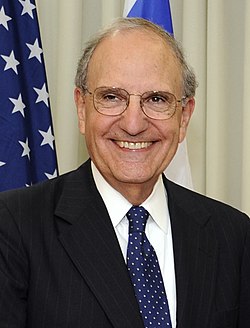Top Qs
Timeline
Chat
Perspective
Senate Democratic Caucus
Formal organization of U.S. Democratic Senators From Wikipedia, the free encyclopedia
Remove ads
The Democratic Caucus of the United States Senate, sometimes referred to as the Democratic Conference or simply Senate Democrats, is the formal organization of all senators who are part of the Democratic Party in the United States Senate. For the makeup of the 119th Congress, the caucus additionally includes two independent senators (Bernie Sanders of Vermont, and Angus King of Maine) who caucus with the Democrats, bringing the current total to 47 members. The central organizational front for Democrats in the Senate, its primary function is communicating the party's message to all of its members under a single banner. The present chair of the Senate Democratic Caucus is Chuck Schumer of New York.
This article needs additional citations for verification. (November 2020) |
Remove ads
Current leadership
Effective with the start of the 119th Congress, the conference leadership is as follows:
- Democratic Leader Chuck Schumer[1]
- Democratic Whip Dick Durbin[1]
- Chair of Steering and Policy Committee Amy Klobuchar[1]
- Chair of Strategic Communications Committee Cory Booker[1]
- Vice Chair of the Caucus Elizabeth Warren[1]
- Vice Chair of the Caucus Mark Warner[1]
- Chair of Outreach Bernie Sanders[1]
- Caucus Secretary Tammy Baldwin[1]
- Vice Chair of Outreach Catherine Cortez Masto[1]
- Deputy Caucus Secretary Brian Schatz[a][1]
- Deputy Caucus Secretary Chris Murphy[1]
- Vice Chair of Steering and Policy Committee Jeanne Shaheen[3][b]
- Vice Chair of Strategic Communications Committee Tina Smith[3][b]
Remove ads
History
The conference was formally organized on March 6, 1903, electing a chair to preside over its members and a secretary to keep minutes. Until that time, this caucus was often disorganized, philosophically divided and had neither firm written rules of governance nor a clear mission.
Chairs
Summarize
Perspective
Since Oscar Underwood's election in 1920, the chair of the Senate Democratic Caucus has also concurrently served as the floor leader as part of an unwritten tradition.
Notes
- According to the Rules of the Democratic Conference section VI.1 "Officers of the Conference" members included 2 vice chairs of the Policy & Communications Committee now restructured into 2 committees; Steering & Policy, vice chaired by Jeanne Shaheen and Strategic Communications, vice chaired by Tina Smith
- Although the Senate Majority Leader for this Congress is unknown, the Republican Party had a majority.
- Although the Senate Majority Leader for this Congress is unknown, the Democratic Party had a majority.
- The Republican Party had a majority in the Senate for the first special Senate session of the 47th Congress from March to May 1881. Beginning with the second special Senate session in October 1881 and continuing until the end of the 47th Congress, the Senate was split between parties.
- Died in office.
- Resigned from office.
- Acting chair.
- Resigned to become Vice President of the United States.
Remove ads
Vice chairs
After the victory of Democrats in the midterm elections of 2006, an overwhelming majority in the conference wanted to reward Chuck Schumer, then the chair of the Democratic Senatorial Campaign Committee, with a position in the leadership hierarchy.[citation needed] In response, then-Democratic Leader Harry Reid created the position of vice-chair when Democrats formally took control in 2007.[4] Schumer ascended to Reid's position following his retirement after the 2016 elections. The position was then split, with one co-chair awarded to Mark Warner and the other awarded to Elizabeth Warren.
Remove ads
Caucus secretary
Summarize
Perspective
The United States Senate Democratic Conference secretary, also called the caucus secretary was previously considered the number-three position, behind the party's floor leader and the party's whip, until in 2006, when Democratic leader Harry Reid created the new position of Vice-Chairman of the caucus. Now, the secretary is the fourth-highest ranking position. The conference secretary is responsible for taking notes and aiding the party leadership when senators of the party meet or caucus together.[5]
The first conference secretary was Sen. Edward W. Carmack of Tennessee, who was elected in March 1903.[6]
The current conference secretary is Sen. Tammy Baldwin of Wisconsin, who assumed the office in January 2017.
Deputy caucus secretary
On December 8, 2022, Sen. Brian Schatz of Hawaii was elected to the newly created position of deputy caucus secretary, assuming the office at the beginning of the 118th Congress on January 3, 2023.[7] This was an elevation from his previous leadership role as Senate Democratic chief deputy whip. On January 3, 2025, Chris Murphy was also appointed to this position.[8]
Remove ads
See also
Notes
- The 60th Congress began on March 4, 1907; however Owen did not take office until the start of the 1st Session of the 60th Congress on December 2, 1907.
References
Bibliography
External links
Wikiwand - on
Seamless Wikipedia browsing. On steroids.
Remove ads



























